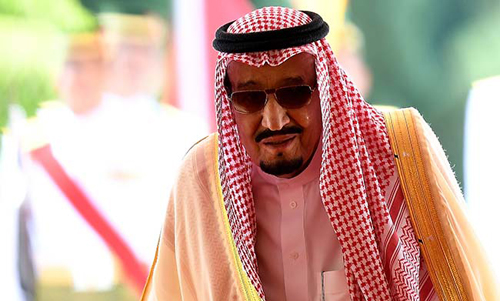Riyadh, Mar 1: Saudi Arabia's King Salman bin Abdul Aziz al-Saud is heading to Indonesia this week for a nine-day visit. It will be the first time in 46 years that a Saudi king has visited the world's largest Muslim nation, and it comes at a time of heightened attention on the economic links between the two nations.

But Salman has come prepared. According to reports in the Indonesian press, the Saudi royal is expected to bring 459 metric tonnes (506 U.S. tons) of cargo with him on his trip - including two Mercedes-Benz s600 limousines and two electric elevators.
Adji Gunawan of the airfreight company PT Jasa Angkasa Semesta (JAS) told the Antara news agency that his company had been appointed to handle the cargo, which had already arrived in the country. Adji said that his company was employing a total of 572 workers to deal with the Saudi King's luggage.
Saudi Royals are often known for traveling in grandiose style. Salman booked out the entire Four Seasons hotel in Georgetown when he visited Washington in 2015. The hotel, one of the most luxurious in the area, has 222 rooms.
That same year, the king was criticized by some locals after his 1,000-person entourage forced the closure of a beach on the French Riviera for three days due to privacy and security concerns. The local mayor also complained to the French president that the Saudi group had poured concrete directly onto the sand in an unauthorized attempt to install an elevator.
A similarly large entourage is expected this week in Indonesia. The Jakarta Post reports that the Saudi group will total about 1,500 people, including 10 ministers, 25 princes and at least 100 security personnel.
While the Saudi king's colossal cargo hold may seem large, it is not necessarily out of scale with other world leaders. When President Barack Obama visited sub-Saharan Africa in 2013, he was accompanied by 56 support vehicles, including 14 limousines, and hundreds of U.S. Secret Service agents tasked with helping secure locations in Senegal, South Africa and Tanzania.
Even when Obama traveled less exotic locales, there were reports of a similarly high level of organization: A 2014 visit to Brussels included a 900-person entourage and 45 vehicles, according to the Guardian. Though the White House later disputed that figure, it said it could not provide a more accurate one due to security concerns.






Comments
If almighty God decides something to be happened none can stop or postpone it. May God protect all of us from Evil.
Add new comment